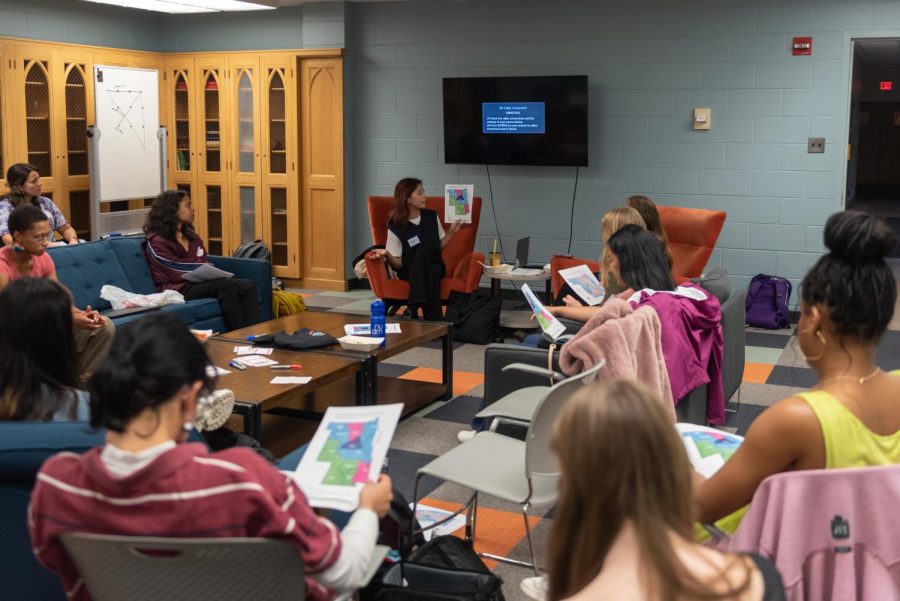Grounding for Public Service Club explores relationship between Northwestern and Evanston
Talia Winiarsky/The Daily Northwestern
SESP junior Lily Ng explains the Evanston wards to the Grounding for Public Service club. GPS discusses inequities in Evanston related to race, health and education.
October 13, 2022
SESP junior Lily Ng baked about 300 zucchini muffins as part of her summer internship. While delicious, they were not for her enjoyment — Ng was working for Evanston Grows, an organization that fights food insecurity in the city.
Ng spoke about her summer internship and other community engagement initiatives at Grounding for Public Service Club’s weekly meeting Tuesday. The club, led by students and Northwestern’s Leadership Development and Community Engagement department, focuses on “place-based learning,” according to LDCE Assistant Director Val Buchanan.
“Grounding for Public Service is an idea of being more informed about the place that you’re living in through an equity lens, so that you can be a more engaged citizen and a better neighbor,” Buchanan said.
Each GPS meeting starts in Parkes Hall with a dinner, followed by a NU or Evanston speaker who discusses community engagement. Members reflect on inequities related to race, health and education.
For some students, the club is complementary to their engagement with community organizations, since it provides them with a space to discuss their work. Ng shared her perspective on civic engagement as a lifelong Evanston resident Tuesday.
“We are a piece of the community, but Evanston is not this place that exists to bend to the wills of Northwestern students,” Ng said.
Ng said it sometimes feels as if strangers have come into the city she’s lived in all her life to voice their opinions, often without actually knowing much about Evanston. The University holds some responsibility in educating students about the city, Ng said, but students should also learn about the town on their own volition.
Last meeting’s speaker was community advocate Karli Butler, director of community leadership at Evanston Community Foundation. Butler presented a recent report from the Evanston Health and Human Services Department, which found that residents of Evanston’s historically Black 5th Ward have a life expectancy five to 13 years shorter than residents in neighborhoods with larger white populations.
Weinberg freshman and GPS member Marina Shirky is interested in learning about practices related to prison abolition and police reform. They said they joined the club to learn more about the local community before beginning advocacy work.
“I don’t want to jump in and start doing things where I don’t know the lay of the land here,” Shirky said.
Weinberg sophomore and GPS leadership team member Brooke Heinicke said though she “knew nothing” about Evanston before arriving at NU, the club has been a great way to learn about the city and its history.
Heinicke said it was illuminating to learn certain aspects of Evanston’s history, especially surrounding the educational inequities caused by a shift in schooling in the 5th Ward.
In the late 1960s, the Foster School, which was a neighborhood school in the 5th Ward, became a magnet school as part of the city’s desegregation efforts, forcing local youth to attend schools farther away. More than a decade later, the school closed altogether, leaving the neighborhood without a school for more than 50 years. However, in March, Evanston/Skokie School District 65’s Board of Education voted unanimously to construct a new school in the 5th Ward.
Heinicke said the club has been rewarding because when she goes for a run or a walk through Evanston’s neighborhoods, she better understands her surroundings. The group welcomes everyone no matter their level of knowledge of the city, Heinicke said.
“If you know things, great,” Heinicke said. “If you don’t, great. We’re just trying to build a sense of community.”
Email: [email protected]
Twitter: @WiniarskyT
Related stories:
— Evanston Grows builds a blooming community, combats food injustice through urban gardening
– Val Buchanan makes it her mission to help students engage beyond the campus bubble


